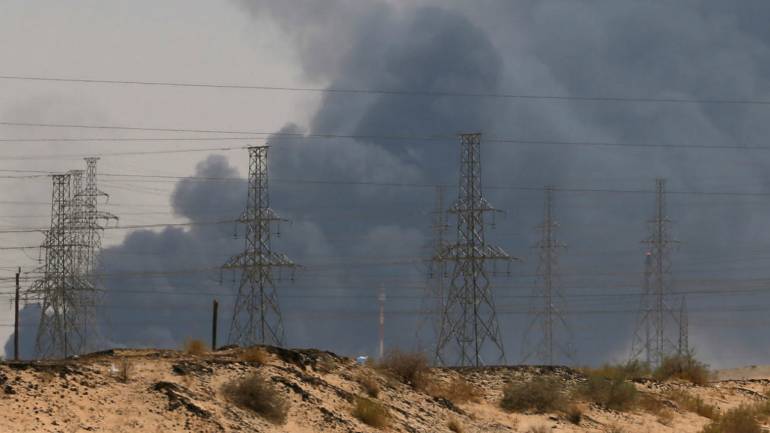LONDON, (Reuters) – The oil market will rally by $5-10 per barrel when it opens on Monday and may spike to as high as $100 per barrel if Saudi Arabia fails to quickly resume oil supply lost after attacks over the weekend, traders and analysts said.
Attacks on two plants at the heart of the kingdom’s oil industry on Saturday knocked out more than half of Saudi crude output, or 5% of global supply.
Industry sources have said it may take weeks to bring production fully online.
Below are quotes from market participants, traders and analysts.
BOB MCNALLY OF RAPIDAN ENERGY
Crude prices would spike by at least $15-20 per barrel in a seven-day disruption scenario and go well into triple digits in a 30-day scenario.
“This does not include what are likely to be large (if difficult to model or predict) premia to reflect zeroing out of global spare production capacity amidst ongoing disruption risks, hoarding, and panic sentiment.”
GREG NEWMAN, CO-CEO OF ONYX COMMODITIES
Expects Brent futures to open $2 per barrel up and close $7 to $10 per barrel higher on Monday.
The market could see a return to $100 per barrel if the issue cannot be resolved in the short term.
In the swaps market, Dubai timespreads could see a $1.50-$2 barrel backwardation as end-users scramble to cover shorts for short-term loading.
Refined product prices will be strong, with particular emphasis on high-sulphur fuel oil given current tightness and that it is the refinery product most closely linked to Saudi heavy crude.
AYHAM KAMEL, EURASIA GROUP
“A small $2-$3 per barrel premium would emerge if the damage appears to be an issue that can be resolved quickly, and $10 if the damage to Aramco’s facilities is significant.”
“The scale of (the) attack will encourage markets to re-examine the need for considering an oil geopolitical risk premium … The attacks could complicate Aramco’s IPO plans given rising security risks and potential impact on its valuation.”
“The U.S. would only release crude from its strategic reserves if damage to infrastructure appears critical or oil prices spike significantly.”
SAMUEL CISZUK, FOUNDING PARTNER AT ELS ANALYSIS
“The outage of 5 million bpd (barrels per day), roughly half of the current Saudi production level and about 5% of global supply, is very large by historic standards. It would in relatively few weeks start to put a stress on the market.”
“This incident is a very uncomfortable wake-up call to radically higher risk premiums on Gulf production.”
CHRISTYAN MALEK, JP MORGAN
“I’d expect a $3-$5 move in oil prices in the short term. The market has been sleep-walking in risk premium in the region, disproportionately focusing on risk to demand growth and shale oil supply.”
“This attack introduces a new, irreversible risk premium into the market.”
Expects oil to rise to $80-90 a barrel over the next three-six months as the market turns its focus to geopolitics.
GARY ROSS, BLACK GOLD INVESTORS
“The heart of the Saudi oil industry has been successfully attacked so look for prices to rise substantially to $65-$70 per barrel.”
“These attacks are difficult to stop and could occur periodically. The market has to price this risk in.”
JOHN DRISCOLL, JTD ENERGY
“This is significant as it takes out twice the volume of the spare capacity in the market, which is at 2.0-2.5 million bpd.”
“There’s going to be an initial panic reaction. Anyone who’s hedged on the short side will want to get out quickly. This may cause a significant spike upwards.”
TILAK DOSHI, MUSE & STANCIL
“In the oil universe, this attack is perhaps equivalent to the 9/11 attacks … Abqaiq is easily the world’s single most important oil production and processing infrastructure site.”
“This puts Iran’s wars-by-proxy in the region squarely in the centre of the security concerns of the Middle East.”
“For Asian governments, perhaps this overtakes the perennial concern about the safety of tanker traffic in the Strait of Hormuz with even more serious concerns about the impact of a direct breakout of hostilities between the Saudi alliance and Iran.”
“Governments throughout the Asian region will perhaps now be more supportive of the U.S. administration’s tough sanctions regime on Iran.”










